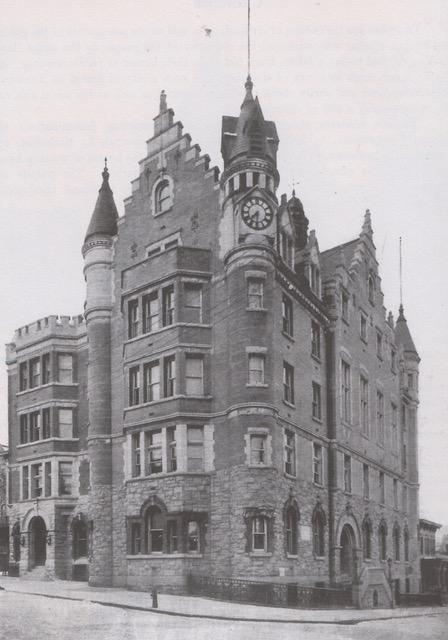
By Mary Hoar, City of Yonkers Historian, President Emerita Yonkers Historical Society, 2004 Key to History recipient, Member of the Yonkers Landmarks Preservation Board, and President Untermyer Performing Arts Council
Monday, May 20th
May 20, 1948: Former Vice-Mayor James Sullivan, found guilty on three accounts of forgery, learned County Judge Elbert Gallagher would not sentence him for at least ten more days. Sullivan had been in County Jail since the trial began a month earlier.
May 20, 1959: Four hundred residents left Yonkers, heading to the non-violent Poor Peoples March on Washington. The group, advocates of the late Dr. Martin Luther King Jr. and religious leaders of all faiths, joined in togetherness to show concern for the poor, and were from from groups as diverse as St. Peter’s and Messiah Baptist’s Head Start to St. Mark’s Episcopal Church to our Human Rights Commission.
Tuesday, May 21st
May 21, 1933: By a margin of eighteen to one, Yonkers voted to elect delegates to the State Prohibition Repeal Convention in Albany. The actual vote was 26,100 for the repeal ticket and 1,424 for the dry ticket.
May 21, 1947: Dr. Irving Blumenfeld of Bajart Place was the only Yonkers resident to exhibit a stamp collection at the Centenary International Philatelic Exhibition in Grand Central Palace in New York. Collectors from all over the world exhibited their stamps to celebrate the 100th anniversary of the United States issuing postage stamps.
Wednesday, May 22nd
May 22, 1923: Drawing on the experience and memorabilia owned by Valentine Lane’s Carl Lachmund, an outstanding musician who studied with Franz Liszt, an article in the June issue of Shadowland magazine featured Lachmund’s work while he was both a student and friend of the composer, including several anecdotes. The Yonkers man owned one of the most valuable collections of Liszt historical documents and photos of Liszt in the United States!
May 22, 1946: The Municipal Civil Service Commission finally released its decision on Yonkers Fire Department’s Lieutenant Thomas Barden’s appeal on his test rating. The test, held almost a year earlier, originally did not include his name on the promotion eligibility list; he immediately appealed, stating some of his answers were not graded properly. The appeal was successful; not only was he on the list, but he should have been first! Unfortunately, since the appeal took so long, the job that should have been his was given to the person now known to rank second.
Thursday, May 23rd
May 23, 1940: American Red Cross first aid instructor and YPD Officer Alexander Rusinko was given a testimonial dinner at the State Armory by members of the Police Department who successfully completed a first aid course under his direction. PO Bernard Wagner presented him with a gift as a token of their appreciation.
May 23, 1950: Yonkers Common Council ordered reopening of Yonkers’ swimming pools, closed because of a water emergency. Third Ward Councilman Mike Nugent introduced the resolution, saying our pools recirculated water and not lose water. City Manager Wagner pointed out if the pools did not reopen, our residents might be tempted to swim in the polluted waters of the Hudson, with no lifeguards or supervision. Corporation Counsel John Galloway informed the councilmen a notice would have to be published in Yonkers’ official newspapers before it could become effective.
Friday, May 24th
May 24, 1944: Eleven-year-old Matthew O’Brien of Knowles Street, sitting on the Ludlow Dock and dangling his feet over the side, got a bad surprise. A Coast Guard cutter moored at the dock suddenly lurched and caught his foot! Emergency treatment was given by the cutter crew, and the boy was taken to St. Joseph’s Hospital, where he was diagnosed with possible multiple fractures of his left foot and leg and admitted to the hospital.
May 24, 1950: Lifelong Yonkers resident and Coach of the NY Knickerbockers Joe Lapchick signed the first African American basketball player to play in the NBA, Nat “Sweetwater” Clifton. He became the second Black player to play in the NBA, playing his first game on November 4. This was four days after the debut of Washington Capitols player Earl Lloyd, the first black player to appear in an NBA game.
Saturday, May 25th
May 25, 1931: The Directors of the Hollywood Inn, a Yonkers stellar institution since opening in 1896, carefully studied their finances. They had a debt of $43,000 and operated at an annual loss of $18,000. They unanimously affirmed their decision to break up the organization and return their property to the Cochran heirs. Although its 250 members wanted to save it, they were unable to put together the necessary financial package to keep it open. Members of the Directors committee to oversee its dissolution were John Dickinson, Richard Edie, Jr., E. Wetmore Kinsley, James Lynch, Edwin Palmer,Robert Neville, E. William Poole, Gus Stahl, William Tomlinson, and William Wallin.
May 25, 1941: Two Yonkers women, determined to make Yonkers the best in the country, formed a coalition of women under the name of “Clean Up Yonkers.” Lena Wilson and Beatrice Benn were the organizers planning the first rally.
Sunday, May 26th
May 26, 1652: Yonkers officially became a Dutch colony; Adriaen van der Donck was granted power to bequeath his lands.
May 26, 1950: Water Superintendent James Fitzgibbon announced Yonkers would once again tap our Grassy Sprain Reservoir to augment our water supply and save thousands of dollars. The filter beds at Tube Well had been cleaned, and its newly installed Tube Well pumps were taking water from the Saw Mill River. The Grassy Sprain and Fortfield reservoirs were being cleaned and repaired. At the time, Yonkers was purchasing NYC water at $105 per million gallons.
Questions or comments on this column? Email YonkersHistory1646@gmail.com. For information on the Yonkers Historical Society, Sherwood House and upcoming events, please visit our website www.yonkershistoricalsociety.org, call 914-961-8940 or email info@yonkershistoricalsociety.org





